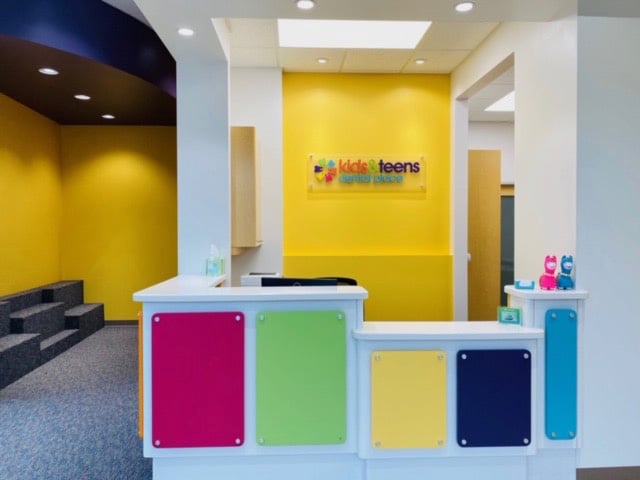
Kids and Teens Dental Place provides comprehensive dental care for babies, toddlers, children and teens in Pearland, Texas. Call 713-413-8282 or contact us today to learn more and schedule an appointment.
When Should Children Have Their First Dental Visit?
The American Academy of Pediatrics (AAP), the American Dental Association (ADA), and the American Academy of Pediatric Dentistry (AAPD) all recommend that children have their first dental visit by 12 months of age, or within 6 months of the eruption of the first tooth, whichever comes first.
Benefits of Early Dental Care
Starting dental care early has many benefits for children:
- Prevent decay. As soon as a tooth is visible above the gum line, it is susceptible to decay. Early dental care involves plaque removal to prevent cavities.
- Establish a “dental home”. An important part of the first dental visit is establishing a dental home, a practice where your child is a regular patient. In case of a dental emergency, you will have a designated place to seek care.
- Get used to the dental experience. By starting dental care early, children grow up with an understanding that going to the dentist is a normal and positive experience.
- Early intervention for dental issues. Some dental problems are present from an early age. Early diagnosis and treatment can be beneficial in the long term and may prevent or reduce the need for further care later.
What to Expect for the First Dental Visit
The first dental visit will typically include the following:
- Introduction. The main purpose of the first dental visit is to introduce your child to the experience of going to the dentist. They will meet the dentist and staff and learn about the dental tools, all in a fun and friendly manner.
- Dental examination. If they are comfortable, we will perform a brief dental examination, looking over the teeth and gums and identifying any potential concerns. Babies and very young children may choose to sit on their parent’s lap during the exam.
- Cleaning of any visible teeth. According to the child’s comfort level, a brief cleaning of the visible teeth will be performed. Again, sitting on a parent’s lap is perfectly acceptable.
- Oral care tips for home. We will also discuss with both parents and children how to take care of their teeth at home. Depending on the age of the child, we can teach brushing and flossing techniques.
FAQs About Your Child’s First Dental Visit
Should I stay with my child during their first appointment?
We welcome and encourage a parent to accompany their child during the first dental visit and consecutive visits for young children and children with special needs. Once your child is comfortable receiving care independently, you can feel free to wait in the waiting room.
When should I start brushing my baby’s teeth?
We recommend cleaning your baby’s gums in early infancy, even before any teeth have erupted. This can be done with a clean washcloth or a soft bristled infant toothbrush. Once one or more teeth erupt through the gums, brush them with a soft bristled infant toothbrush and tiny dab of fluoride toothpaste.
Is it ok for my baby to use a pacifier or suck their thumb?
For infants and toddlers, sucking on things like pacifiers or fingers is normal. Pacifier use is even recommended for reduced risk of SIDS. Dental problems from pacifier or thumb sucking only occur when the habit continues too long. Children should stop by the age of 3 if possible. An oral appliance can be used if necessary to help break the habit.
How can I prevent early tooth decay?
Tooth decay can occur in infancy when babies nurse or drink from a bottle constantly without breaks between feedings. It also helps to brush your baby’s teeth once or twice a day. Brush their teeth after their last feeding of the day before they go to sleep for the night.
